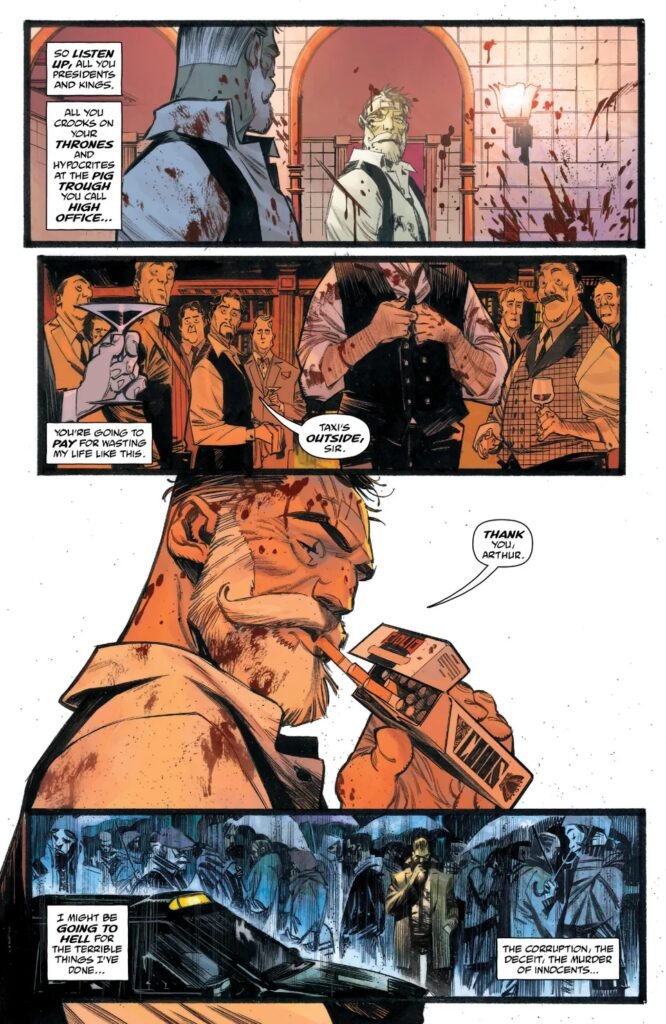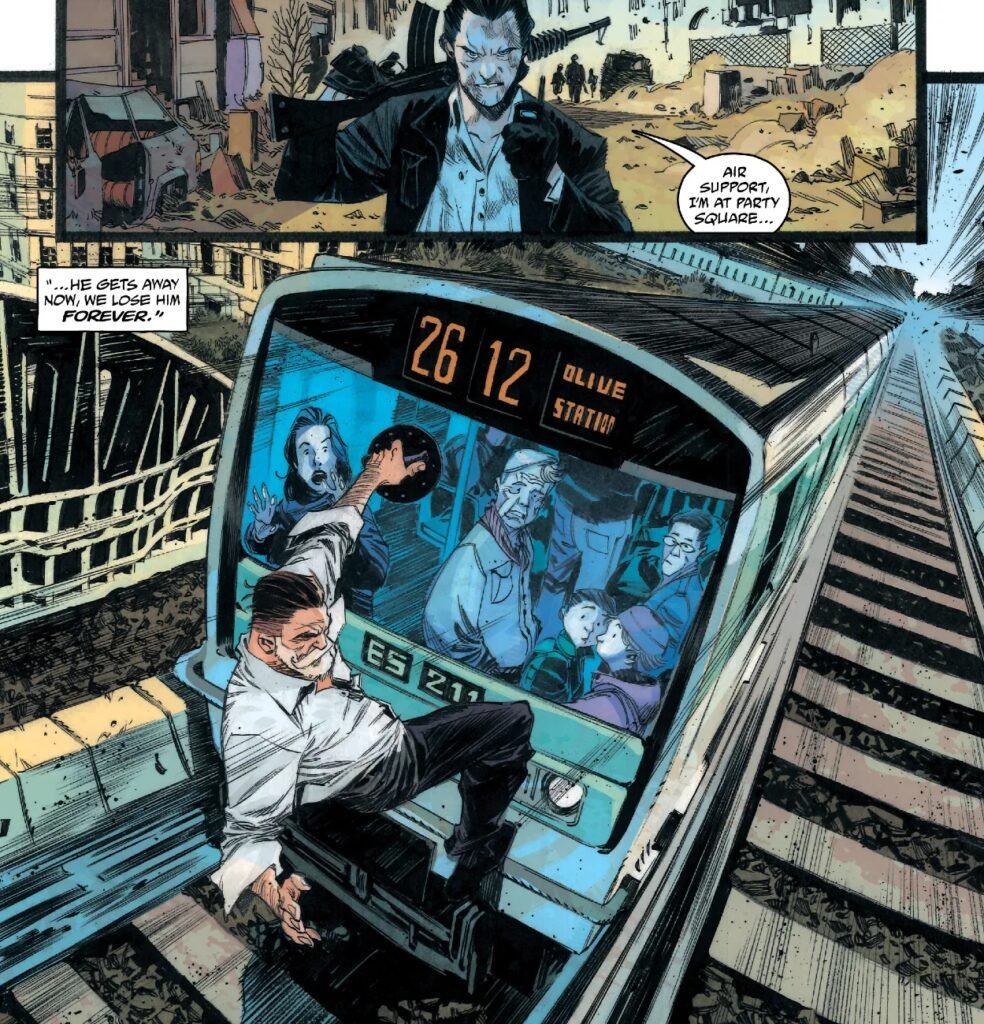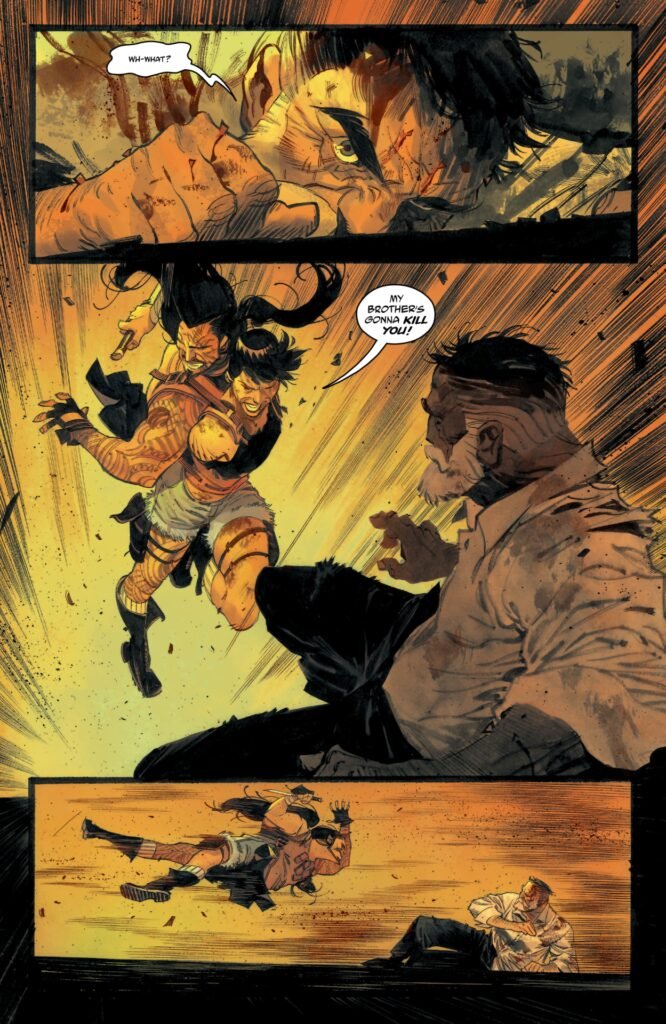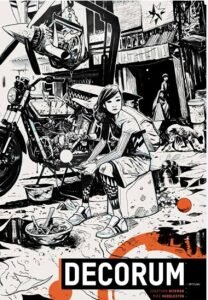Writer (King of Spies): Mark Miller
Artist (King of Spies): Matteo Scalera
Image Comics / (Netflix / Millarworld), 2021-2022
Writer (Desolation Jones): Warren Ellis
Artist (Desolation Jones): J. H. Williams III and José Villarrubia
Wildstorm, 2005-2007
Writer and former spy Ian Fleming’s famous fictional character, James Bond, has been haunting our cinemas and televisions for decades. Bond has also relatively recently appeared in a series of comic books, about which we have previously written: see . Bond is a ruthless secret agent. Bond is “licensed to kill”: a shadow warrior who is at liberty to inflict death upon those who interfere in his mission. Historically, Bond is also a serial romancer of women. There has never been much of a moral compass to either of these pursuits.
What happens when James Bond gets very old and retires? These two titles, King of Spies and Desolation Jones, offer two very different scenarios, built on the Bond mythos, and both, curiously, hinging on family.
Both writers know Bond. After Desolation Jones, in 2016 British writer Warren Ellis went on to write James Bond stories for Dynamite Entertainment (which we have reviewed- https://worldcomicbookreview.com/2016/02/27/lord-cardigans-sabre/ ). As for Mr Millar, his creation The Kingsmen, a set of fun, British espionage stories the subject of no less than three motion pictures, is pedigree enough. (We have previously reviewed a Kingsman story: https://worldcomicbookreview.com/2017/09/22/kingsman-red-diamond-1-review/ .)
King of Spies
Mark Millar’s brilliant four issue series, King of Spies, concerns Sir Roland King, a retired secret agent who has been installed on the boards of defence companies and spends time in his posh London men’s club. King has a white, waxed beard and a very slight paunch. A life of selfish indulgence, at the expense of others, and intense violence is behind him. King’s wife is long estranged from him, and paints miserable self-portraits from her residence on a Mediterranean island. King’s son, Atticus, will not return his calls.

Two events cause King to reflect on his life’s journey. One is a meeting with Queen Elizabeth II, who benignly notes that the medals King has received are not for courage, but for sacrifice. King looks completely startled. It is clearly a perspective he had not previously considered – he lost so much to get where he is. The second event is a brain tumour. King is told he has six months to live.

King ruminates on his life, and the misery he has caused over the years. Some of this comes out in terrible detail as the story progresses: teaching government soldiers how to torture, casting aside women as discarded pawns in unrelenting infidelity, shooting, knifing, bombing, maiming, all with an overlay of hubristic flair.

In what is characteristically Mr Millar’s preoccupation dating all the way back to the notorious stint as writer of Wildstorm Comics’ The Authority in 2000-2001, King decides to apply violence to the rich, powerful, and grotesque sitting within the strongholds of business and government. Mr Millar was militantly anti-fascist in his writing long before Antifa was ever raised as a bogeyman by the American far right.

King then leads his former masters in British intelligence on a merry chase of death and mutilation across the world. Eventually King dresses in his naval uniform and surrenders himself to MI5’s Vauxhall headquarters. He is quickly shot dead by his friend and former boss. An eyeball and mushed skull stain the concrete floor of King’s holding cell. There is no improbable Bond escape here. The surrender is a distraction, and a method of evacuating the nearby public, from the bombing of the Houses of Parliament. As King says to himself in an inner monologue at the conclusion of the first issue, “If I’m going to die, I am going to take the cunts with me.” King was successful in that undertaking.
Desolation Jones
Desolation Jones was a series written by British writer Warren Ellis, with art by one of the most talented artists in the American comic book industry, J.H. Williams III. The title character, Michael Jones, is a decommissioned British intelligence operative, left to live in a loose community of similarly discarded agents in Los Angeles. Jones is by reason of his experiences incapable of feeling anything, and suffers from bizarre, bright hallucinations. It is not Jones who is the Bond substitute, but his client, Colonel G.G. Nigh. Colonel Nigh is a former Pentagon spook, a man sitting in a basement slowly falling to pieces as a consequence of all of the sexually transmissible diseases he picked up in his years as a master spy. Nigh is American, but that is the only differentiator between the character and a sexually hollowed-out Bond.

We never see Nigh’s appearance in his prime. He is a diminished figure, connected to a drip, his bloodshot eyes hooded and pained, sucking air through a hose. But when Mr Ellis’ famously perverse sense of humour leads him to have Nigh crippled by his sex life rather than some terrible outcome from a secret and lethal mission, we conclude that Mr Ellis thus pokes fun at the Bond mythos. Nigh is not like King. Before he goes rogue, King is a grise éminence of the intelligence community. Nigh is instead a punchline, the inevitable consequence of a lifetime of indiscriminate sex. “Oh, I have many problems, Mr. Jones. The aftermath of a lifetime as a soldier and a world-class sexual adventurer. For fifty years the fleshpots of the world were my fingerbowl. And now you witness the fruit of my labours. I am possessed of over seventy separate diseases. My every organ worked to failure in pursuit of the beast of two backs. Indeed, on one memorable occasion forty-eight backs“.
And even in his final stages of life, Nigh apparently continues to indulge in decadence. Nigh has ostensibly engaged Jones to locate a stolen pornographic film – a Hitler sex tape. “Ex-spook porno producers steal an ex-spook colonel’s private stash of Hitler’s home-made sex flicks? Gaaaaaaah!” yells Jones, baffled by the outrageousness. It is hilarious stuff, on the face of it. But the plot is much more complicated, and grim, than merely that.
Family and Freaks
Family is not something which we see in Mr Fleming’s books. The motion picture Skyfall takes us back to the near-abandoned Bond ancestral home in Scotland, where we see the lonely graves of Bond’s parents. And in No Time To Die, we (and Bond) met Bond’s very young toddler. But these are aberrations. No doubt in order to detach Bond from the vulnerability of enduring relationships, all we know of Bond’s family from the books is that he is an orphan.
Nigh has three daughters. The youngest is Jessica, who has fallen into Los Angeles’ pornography industry. As Jones notes, “She’s a lot like Daddy. Because Daddy likes the shagging, doesn’t he? Should have seen her fade when she found out her employers are paying less than market value for fresh chicken meat.” (Jones shoots her and kills her.)
The oldest, Angela, is the spook, and while she allowed her father to lift her to a point within the NSA hierarchy, she does not think much of her father’s lifestyle choices: “What? You owed me that. The succession of idiot whores parading through the house.” Such is the judgment of a daughter of a James Bond-esque character. (Jones shoots Angela dead, too.)

Paula, the final daughter is a film maker, who is left alive by Jones to make a documentary about Nigh’s involvement in a secret and highly illegal Army human trial, at a place called Temple Farm. The stolen Hitler porn, it evolves, is actually a reel of Nigh’s documentation on the experiment.
Jones kills Nigh himself last: Jones is disgusted by the truth of Temple Farm.
King, like Nigh, has children in the family business. King’s son Atticus is a vicious spook with an abandonment complex. While the young Atticus waits by the window for days for his father to return home to celebrate a pre-teen birthday, King is involved in yet another infidelity. These scenes are poignant, and tougher to process than anything else in the story. King leaves a trial of corpses across the planet during his days as an agent for Queen and country, but the victim closest to him is his young son, emotionally savaged by his father’s selfishness.
Atticus King and Angela Nigh could be colleagues. They both live their lives with a veneer of contempt and a deep-seated bitterness. But Atticus has the violent flamboyance of his father, whereas Angela King is much cooler. And while Angela is contemptuous of her father, Atticus is determined to see his father dead.

An important element of the Bond mythos is the designation of abnormal people as freakish adversaries. We see this repeatedly in Bond-related media: Dr No with his metal claws, Jaws, Raoul Silva and his disfigurement by cyanide, Le Chiffre’s ever-bleeding eye. Sure enough, both Desolation Jones and King of Spies have the same sorts of characters. King of Spies features a brother and sister team of assassins who were caught in a bombing, courtesy of King. She has lost her arms and he has lost his lower body. They are obsessed with revenge: King does not even remember them.

In Desolation Jones, the strangeness is even more pronounced. The title character himself is a classic Bond villain: by reason of the Desolation Test, he is incapable of feeling pain (as with Renard in the Bond movie, The World Is Not Enough. Mr Ellis extends this in 2016 in James Bond: Vargr, where a typical Bond thug, Masters, ridiculously thrives on pain). Other characters include Jeronimus, who as a consequence of an experiment needs only eat once a year but is exclusively carnivorous: he dons metal teeth (like the Bond villain Jaws) and hunts cattle. A more poignant figure is Emily. Emily is beautiful and charming, but Emily was the subject of an experiment which went wrong. The purpose of the experiment was to enable Emily to create pheromones so that she would become irresistible – a “honeypot”. Instead, Emily oozes pheromones which trigger a supercharged reaction as some people have to spiders – revulsion to something alien. Only Jones is unaffected by Emily, by reason of his own malady.

King and Nigh
How much of a gap is there between King and Nigh? At one stage King and Nigh even look very much to be in the same boat:


Critic Raul Arias Philipi, writing for ScreenRant https://screenrant.com/king-of-spies-mark-millar-james-bond-silva/ puts the theory that King is actually more akin to Bond villain Raoul Silva: “Realizing that the world has stayed the same at the expense of his own life and wellbeing, Roland finally has his Raoul Silva moment, becoming determined to smash the system, with motivations rooted in the dreaded question everyone comes to ask at some point or another – “Was it really worth it?””
Both King and Nigh are illuminated at times. King smokes cigarettes (the family brand, Cobbs). Lighting a cigarette causes King’s face to suddenly appear out of the darkness. Artist Matteo Scalera does this twice, symbolising king’s elevation from the shadows.

Nigh on the other hand is illuminated first in blue (in issues 1 and 6) by various screens monitoring his health. As the story reaches its bloody crescendo, Nigh and the panels around him are flooded with red.

The fundamental difference between the two types of Bonds is that, in Desolation Jones, Bond as Nigh loses. He is thoroughly defeated by the circus ensemble of grim antagonists – Desolation Jones, the mortifying Emily, the carnivorous Jeronimus, and a robot bomb-maker named Robina. Desolation Jones is a fundamentally clever, sinister story, in which by a very subtle slight of hand we are lead to think the villain is the hero. (Nigh’s involvement in Temple Farm means there are no heroes at all in Desolation Jones. Bond, for all of his many failings as a human being, would never have run a brainwashing project with his nameless horrors, and then closed it down by killing all the participants in a fire and covering it up with a story about a death cult. Nigh, on the other hand, is not just trying to preserve a government secret: he is trying to cover up his involvement in it.) In King of Spies, King dies on his own terms, gouging an enormous price for his life upon the world’s cabal of the wealthy and powerful. King is the more superficial protagonist – revenge is a sharp but thin blade, and parental guilt a big blunt hammer. But then, Bond himself was never a complex character, either.

